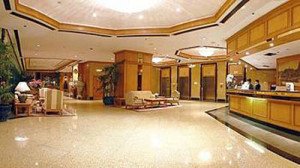
BANGKOK — The fallout from Monday’s deadly bomb attack on the popular Erawan shrine continued as rumors that Chinese tourists were deliberately targeted began to affect businesses that cater to to them. In particular, 3-star hotels with tasteless, mirror-panel décor were reported to be on raised alert as tensions remained high throughout Thailand.
“Our clientele is about 90% mainland Chinese,” said Thaiyapoon Rungsawan, the general manager at the Pearl Mansion Hotel, a mid-size Sukhumvit hotel that was built in 1986 and hasn’t been significantly renovated since.
“The possibility that someone may want to target Chinese people worries us. We’d be such an easy target,” she said, pointing to the Formica-floored, fluorescent-lit restaurant, where about 160 mainland Chinese tourists were loudly consuming a breakfast buffet that included instant coffee and hot-dog “sausages.”
“Without Chinese people, I’d have no guests at all,” she admitted. “What can I do?”
Recent rumors that the bomb was the work of Uighar separatists who might be taking revenge on the Thai government for its July rendition of Uighar refugees to face trial in China has caused many to speculate that the Erawan shrine was targeted because of its popularity with Chinese tourists. At least four Chinese nationals are among the dead, with several dozen wounded.

“If the Chinese are being targeted, then the next attack could very well aim for high-density Chinese tourism areas,” noted Hong Kong-base security analyst Morgan Hu. “That means every mediocre hotel with a filthy crystal chandelier in the lobby could be at risk.”
The Thai government has yet to announce specific upgrades in city security as part of its response, but as of Thursday increased security presence could be seen in Bangkok’s large malls and public transportation stations. Larger corporate hotels and office buildings have also stepped up their security.
However, the estimated 250 mid-rise, small-windowed, floral-art infested hotels throughout the capital that serve the mainland Chinese market are mostly unable to improve security, or much of anything.

“Our hotel runs on very thin margins,” explained Jumra Kasitchaween, the day manager at the Siam Palace Hotel near downtown. “Our group deals with Chinese tour companies barely let us break even.
“The Chinese tourists steal the towels, the pens, sometimes even the bathmats. We can’t afford to clean the kidney-shaped pool, much less upgrade security.”
Managers of other poorly-lit, cigarette-odored properties in Bangkok expressed similar sentiments, as did proprietors of other establishments that were favored by mainland Chinese.
“We have over 1,000 Chinese people in here every evening,” said Suval Pandreesha, the manager at a massive Cantonese seafood-themed Seafood Market restaurant on Sukhumvit soi 24. “They’re the only people willing to pay inflated prices to eat endangered sea creatures. It’s our entire business model.”
Suval claimed that the restaurant management wanted to improve security in the wake of the bombings, but that it proved impossible.
“We have hundreds of mainlanders here, shouting, drinking, carrying luggage and shopping bags, refusing to queue, arguing the bill. It’s the like fall of Rome in here every night.

“How can you spot suspicious activity among sociopaths?”
For Thaiyapoon, the increased risk is something that hotels like Pearl Mansion simply have to live with, because it’s the nature of their business.
“The first hotels in Bangkok housed American soldiers. Then came the sex tourists. Then the Japanese, then Arabs, then Russians,” she said.
“No matter who your guests are, somebody, somewhere, wants to kill them.”


